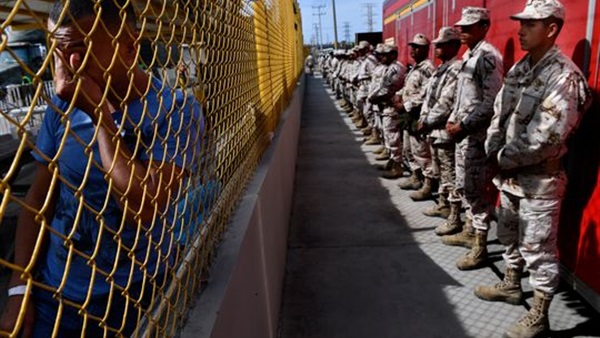After fleeing violence at home, migrants wait patiently at Texas border to enter U.S.

Freddie Valdez doesn’t have a specific location in mind.
Anywhere in the U.S. is better than home.
The Honduras citizen left home more than 20 days ago. He
walked, hitchhiked and eventually got on a bus to make his way to Piedras
Negras, directly across the Rio Grande from Eagle Pass, Texas.
He was part of the caravan of 1,800 migrants seeking asylum
Thursday. They arrived at the border town Monday.
“I want a better life for my family, back home the situation
was bad,” he said. “It was too dangerous.”
He plans to wait his turn, as long as it takes to get his
permit to get into the U.S. Then he will send for his family to join him. U.S.
officials said Wednesday they can process about 16 asylum seekers daily.
Honduras is plagued with violent crime, and its murder rate
remains the highest in the world despite being drastically curbed in recent
years, according to Human Rights Watch.
Throughout the day, buses were loaded with people opting to
self-deport back to Honduras.
The fenced compound holding the migrants is about a
20-minute drive from the border and was once a factory. Mexican police with
riot gear stand watch along the perimeter.
Some migrants, mostly the men, stand at the barricades, some
sleep on blankets or chairs while kids do crafts at a nearby table or play
soccer and other games in the courtyard.
Earlier in the week, on the U.S. side of the border, about
500 Texas state troopers, 50 reserve deputies from across the state and 250
active duty military were dispatched to the area around Eagle Pass in response
to the influx of migrants in Piedras Negras.
Alvaro Miranda held up his phone showing a photo of
injuries, his arms bruised and beat from a confrontation with a gang in El
Salvador.
Like others, he joined the caravan to seek asylum for a
chance to find a better life, he said in Spanish to a translator.
The caravan started in Honduras, but along the way
Guatemala, Nicaragua and El Salvador citizens joined. Miranda said the caravan
was organized by someone they knew as "Carlos," but he was deported
before they reached Piedras Negras.
Miranda said they came to the Texas border instead of
northern Mexico ports like Tijuana because they felt there were likely fewer migrants
in Piedras Negras, making it a safer port to seek asylum.
Miranda said the migrants didn’t know they would be detained
for processing for so long.
He said one of the problems is the lack of communication and
orderly way to process the migrants. Each person was given a wristband with a
number, yet the immigration officers are not calling people in numerical order,
he said.
“I’m number 897 and I will wait patiently if I knew there
were 897 before me, but it seems to be who woke up first in the morning or a
random person they pick,” he said.
In El Salvador, Miranda worked long hours for low pay. When
he finally got paid, he would turn a corner and run into organized criminals
who would take his money. He sustained his injuries during such an encounter.
“In my country, instead of the young burying the elderly,
it’s the elderly burying the youth,” he said. “Because the youth are being
taken over by the cartel.”
Leaning in on the yellow fence, the men standing with
Miranda agreed. Going back is not an option for them. They agreed it's worth to
wait for asylum.
There to assist with humanitarian efforts, a team with
Doctors Without Borders continue to assess the needs of the migrants at the
shelter. The team has carried out mental health consultations mainly so far.
A loud speaker crackled in the compound, and lunch was
announced. The men dispersed to stand in long lines to receive a plate with
chicken, beans and rice.
“We come in peace to look for work and help our families, we
didn’t set out with the idea of violating the law,” Miranda said. “We are
workers and we want a better life.”





